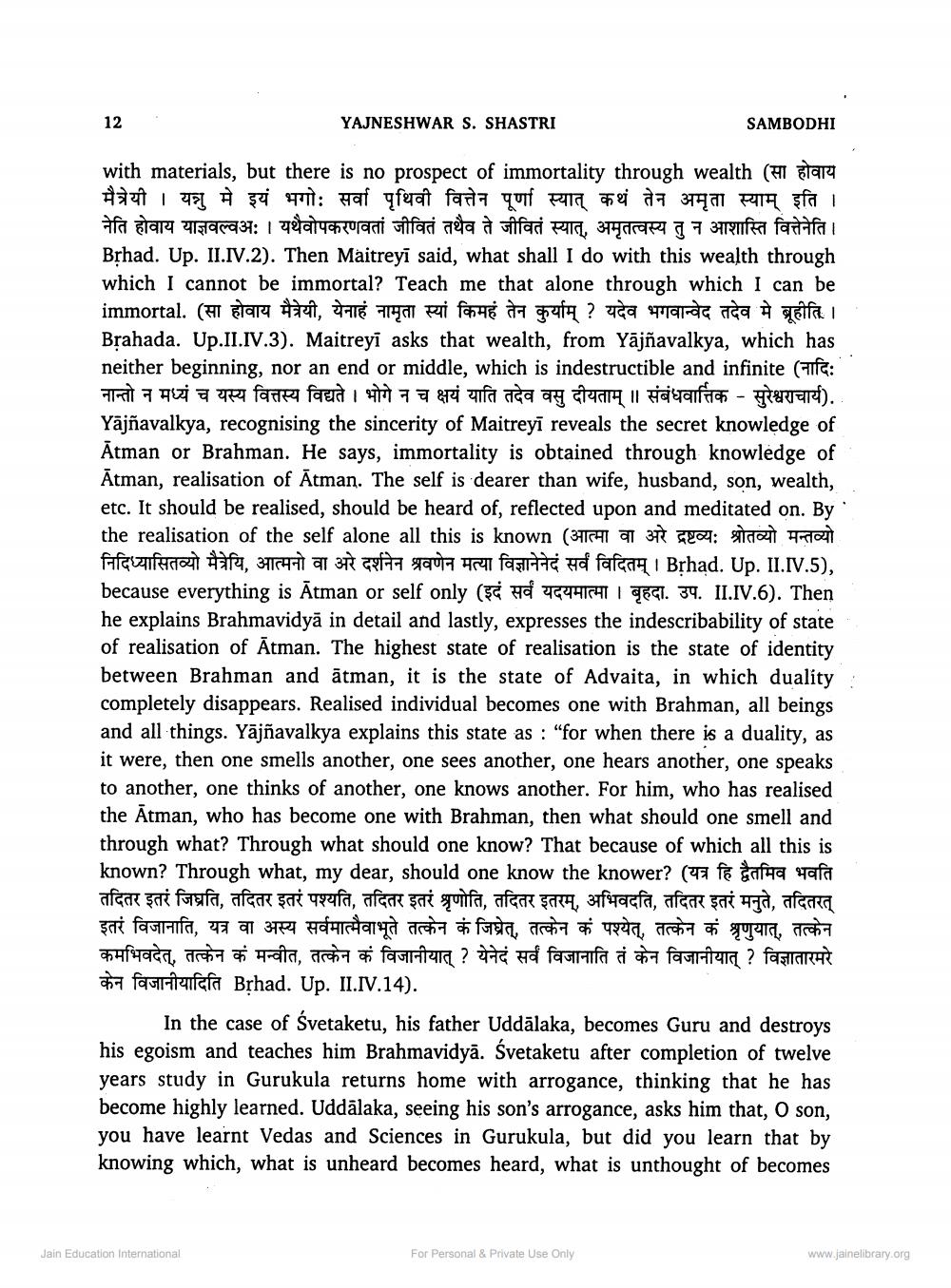________________
12
YAJNESHWAR S. SHASTRI
SAMBODHI
with materials, but there is no prospect of immortality through wealth ( ag मैत्रेयी । यन्नु मे इयं भगोः सर्वा पृथिवी वित्तेन पूर्णा स्यात् कथं तेन अमृता स्याम् इति । नेति होवाय याज्ञवल्वः । यथैवोपकरणवतां जीवितं तथैव ते जीवितं स्यात, अमतत्वस्य त न आशास्ति वित्तेनेति । Bịhad. Up. II.IV.2). Then Maitreyi said, what shall I do with this wealth through which I cannot be immortal? Teach me that alone through which I can be immortal. (H tary #ret,
T al oli fa
e ft ? ya aina gaaf Brahada. Up.II.IV.3). Maitreyi asks that wealth, from Yājñavalkya, which has neither beginning, nor an end or middle, which is indestructible and infinite (Fifs: नान्तो न मध्यं च यस्य वित्तस्य विद्यते । भोगे न च क्षयं याति तदेव वसु दीयताम् ।। संबंधवार्तिक - सुरेश्वराचार्य).. Yājñavalkya, recognising the sincerity of Maitreyi reveals the secret knowledge of
or Brahman. He says, immortality is obtained through knowledge of Ātman, realisation of Ātman. The self is dearer than wife, husband, son, wealth, etc. It should be realised, should be heard of, reflected upon and meditated on. By the realisation of the self alone all this is known (315HT AT 37 5004: So fiff comfy, 311647 al 31 gefta sau HRT fast ad fafcat i Brhad. Up. II.IV.5), because everything is Ātman or self only (FS 264H15HTI TEGI. 34. II.IV.6). Then he explains Brahmavidyā in detail and lastly, expresses the indescribability of state of realisation of Ātman. The highest state of realisation is the state of identity between Brahman and ātman, it is the state of Advaita, in which duality completely disappears. Realised individual becomes one with Brahman, all beings and all things. Yājñavalkya explains this state as : "for when there is a duality, as it were, then one smells another, one sees another, one hears another, one speaks to another, one thinks of another, one knows another. For him, who has realised the Ātman, who has become one with Brahman, then what should one smell and through what? Through what should one know? That because of which all this is known? Through what, my dear, should one know the knower? ( te daria yafa तदितर इतरं जिघ्रति, तदितर इतरं पश्यति, तदितर इतरं श्रृणोति, तदितर इतरम्, अभिवदति, तदितर इतरं मनुते, तदितरत् इतरं विजानाति, यत्र वा अस्य सर्वमात्मैवाभूते तत्केन कं जिघ्रत्, तत्केन कं पश्येत्, तत्केन कं श्रृणुयात्, तत्केन कमभिवदेत. तत्केन कं मन्वीत, तत्केन कं विजानीयात् ? येनेदं सर्वं विजानाति तं केन विजानीयात् ? विज्ञातारमरे 07 Fagrilufa Brhad. Up. II.IV.14).
In the case of Svetaketu, his father Uddālaka, becomes Guru and destroys his egoism and teaches him Brahmavidyā. Śvetaketu after completion of twelve years study in Gurukula returns home with arrogance, thinking that he has become highly learned. Uddālaka, seeing his son's arrogance, asks him that, O son, you have learnt Vedas and Sciences in Gurukula, but did you learn that by knowing which, what is unheard becomes heard, what is unthought of becomes
Jain Education International
For Personal & Private Use Only
www.jainelibrary.org




